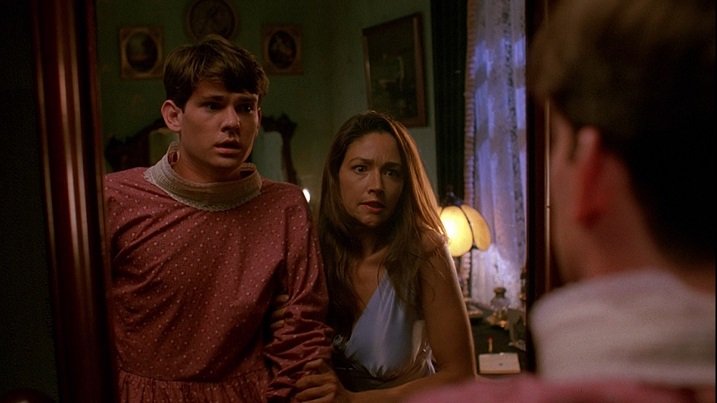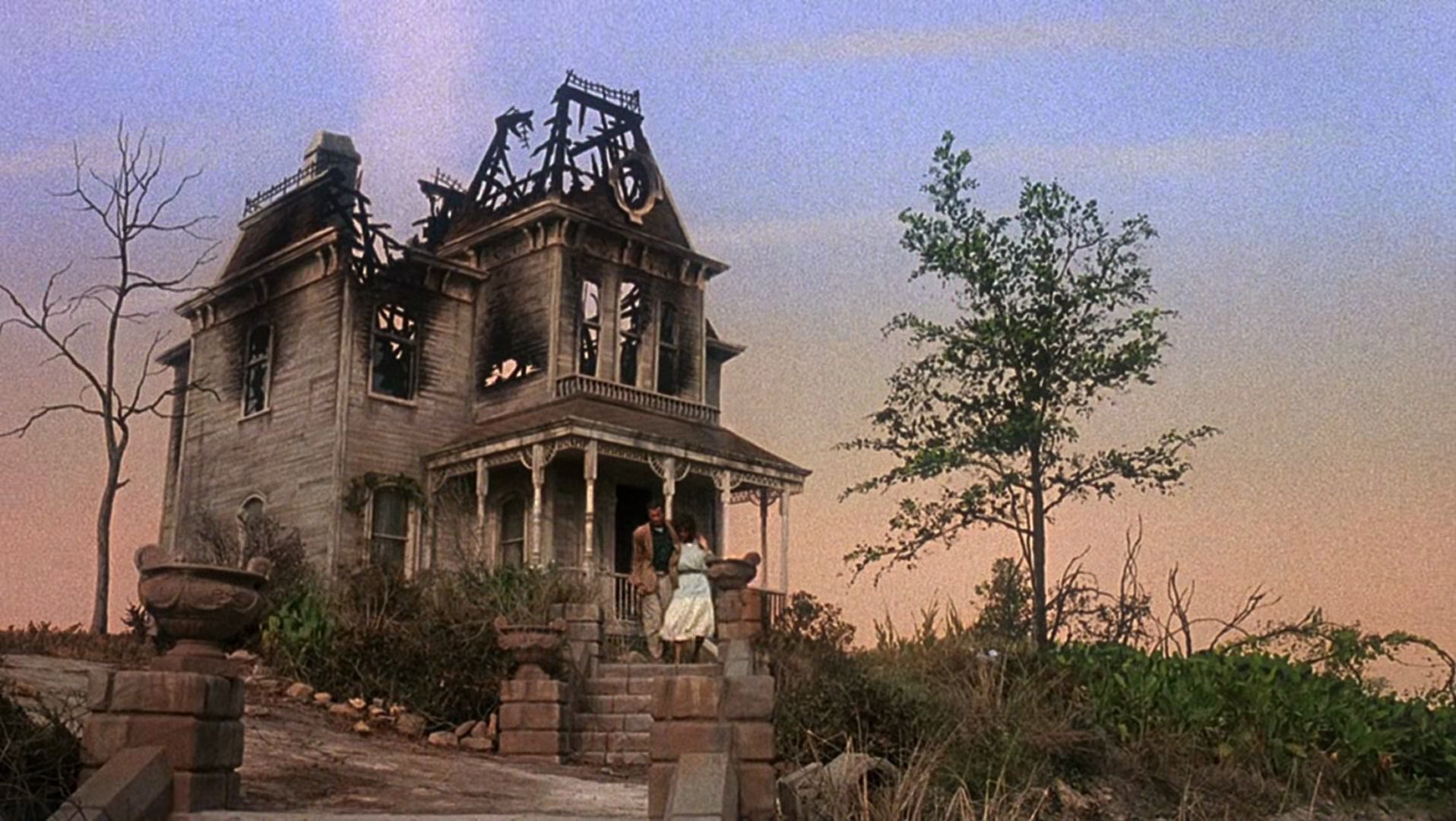[Pride 2022] The Solace of Horror: Psycho IV and Me
PLEASE CONSIDER DONATING TO THE GAYLY HELPFUL FUNDRAISER FOR THE TRANSGENDER LAW CENTER
“In my beginning is my end. In succession
Houses rise and fall, crumble, are extended,
Are removed, destroyed, restored….
Old stone to new building, old timber to new fires,
Old fires to ashes, and ashes to the earth….
Houses live and die: there is a time for building
And a time for living and for generation
And a time for the wind to break the loosened pane”
TS Eliot, “East Coker”
“See Psycho II if you want,” someone once told me, when I was a sixteen-year-old obsessed with Norman Bates, “but avoid Psycho IV at all costs.”
This was the advice I had already gathered from reading reviews of the Psycho sequels; Psycho II was the sequel that most people liked, and its reputation gets better and better as time passes. Psycho III, while more divisive thanks to studio meddling and its campy presentation, still has its fans. But Psycho IV -- that one was irredeemably bad. Nobody ever said a good word about it.
I can understand why. It’s hammy and goofy, with glaring issues in its plot and dialogue throughout the entire runtime. It’s what you’d expect from a made-for-TV movie advertising itself as a prequel/sequel to a thirty-year-old film, even if that film is one of the most highly-regarded movies ever made. And yet, my opinion about Psycho IV the first time I saw it was positive. And, upon rewatch seven years later, that opinion has only improved.
The reason why I loved Psycho IV was completely lost on me when I was sixteen. As an adult, however—one that has come out as a bigender gay trans man, and has been diagnosed with a dissociative disorder following childhood sexual trauma—the answer is much clearer to me: I am Norman Bates, in some spiritual sense.
I realize how absurd this idea sounds. It’s so absurd that I’ve restarted this article a dozen times trying to find the right words to verbalize how I feel about this iconic character. After so much has been said about how Norman Bates stigmatizes DID and trans people, particularly trans feminine people, coming out now and saying that Norman Bates reflects my experiences as a dissociative trans person feels like I’m being purposely contrarian. But it’s the truth, something I knew from the second I first saw Norman Bates appear on screen in Psycho, even if I couldn’t identify it back then.
The explanation for this is, at first, pretty simple: he experienced incest and I did, too; he has DID and I was diagnosed with it, too; his dissociation leads him to embody a much more assertive female persona, and mine does, too. And while he seems to be unquestionably male from birth, a fact which is emphasized by some narrative points present in Psycho IV, there are still scenes like Norma putting Norman in a dress and makeup and locking him in a wardrobe until he admits that he’s her little girl that feel so viscerally relatable to my experiences as a trans man. I first watched that scene just weeks after my junior prom, during the leadup to which my parents had berated me in the middle of a crowded clothing store for being a “tranny” and betraying the image of the little girl they wanted because I insisted on wearing a suit.
But I don’t relate to Norman the way I do just because we have some commonalities. My experiences do not mirror his completely, and I find more and more that I relate to him in a way that feels more abstract. For instance, I don’t go into a homicidal rage when I’m dissociating -- that much is a harmful myth about DID. But his “mother” personality and my female counterpart are both responses to triggered sexual trauma. Norman’s inability to engage sexually with others also echoes struggles of my own, as a gay trans man who grew up in a sexually abusive and conservative Christian environment.
My relationship with my sexuality has always been tenuous and is often challenged by transphobes, who routinely label me as a sexual predator who is attempting to exterminate the existence of cis gay men. In a way, I feel like Norman, because I am seen as a monstrous evil. In another way, I feel like Norman because I readily distance myself from the chance of fulfilling relationships, due to fear of how my transness might impact it—much like how Norman fears getting close to others, due to his worry that they will come to harm by associating with him. And while I’ve mostly made peace with the female persona I slip into in times of dissociation, there are still moments of deep-rooted anxiety, like when I cross-dressed and went to a gay bar with my boyfriend. Even though I knew I was safe with him, I felt like an imposter, an invader, a menace to those around me.
This helps explain my attachment to the Psycho movies. Although Norman is the antagonist of the first film, Hitchcock’s idea to cast Anthony Perkins in all his boy-next-door charm as Norman disarms us, allows us to feel a certain sympathy for him, before revealing his role in the murders of the hotel’s visitors. After all, he didn’t kill Marion and Arbogast; his “mother” did. By Psycho II, however, the franchise becomes resolutely pro-Norman: the entire film is essentially a retelling of Gaslight, where Norman Bates replaces Ingrid Bergman’s character as Lyla attempts to drive him “insane” again, so that he’ll be institutionalized for the rest of his life. And while Psycho III wavered on the stance of Norman’s innocence a bit due to studio demands, it still does promote the idea of Norman as a victim, rather than an aggressor. The recurring theme is obvious: Norman Bates is not a monster.
Then Psycho IV comes.
Psycho IV is the movie I needed when I was sixteen. Its depiction of sexual anxiety and gender confusion and incest and sexual abuse, even if somewhat gauche and exploitative, generated a sense of recognition in me that no film had ever done before. Even more importantly, Norman gets his happy ending. While this resolution is a very heteronormative one -- he has a wife and a baby on the way that he’s looking forward to, after previously worrying that his child would be as evil as him -- I don’t necessarily mind, as Anthony Perkins was gay, newly diagnosed with AIDS, and had spent much of his life in conversion therapy before finally marrying a woman and having two children with her. Perhaps, to him, this really was his happy ending, contradictory as it may seem.
What really matters to me, however, is the climax, where Norman returns to the Bates Motel and sets the famous Victorian-style house he grew up in on fire. It’s the most cathartic ending imaginable, as Norman destroys the tangible representation of his childhood trauma, in order to live the life he’s been striving for. Bad memories confront him at each turn as he attempts to leave the house, but each time he overcomes them. He literally escapes his past to reunite with his future.
That is what makes Norman Bates so powerful for me. I identified myself in him with Psycho, where his character existed to exploit the fears of Cold War America, and that could have been all. I could have seen myself begin and end as the serial killer, as the predatory gay trans man whose complicated and contradictory relationship with my gender and sexuality poses a threat to basic civil society. And yet, the Psycho movies continued on, all the way up to Norman freeing himself from the shackles of the past and perceptions of the present, by his own force of will.
As an adult, I resonate more with the Norman of Psycho IV than any of the other Psycho movies. I still have my own houses to burn down, my own private traps to escape from -- but I can see a future waiting for me through the windows. I can see my boyfriend, who loves me for the genderfuck that I am, and I can see a future where, maybe, I am not considered a public danger, and where, just maybe, I can be myself and not care about what others have to say about me. Psycho IV, with all its flaws, can never be a bad movie to me. It’s the movie that gave me hope when I needed it most.
Thanks to Miguel Roel for helping me edit.


![[Pride 2022] The Solace of Horror: Psycho IV and Me](https://images.squarespace-cdn.com/content/v1/5b39608d75f9eef54c62c3f0/1656342022957-BFL4A9657KNSOSB3YFS1/FFtpf18X0AU6Q3V.jpg)



![[Pride 2022] Final Girl and Slasher?: The Complex Identities and Sexualities of Chucky's Nica Pierce](https://images.squarespace-cdn.com/content/v1/5b39608d75f9eef54c62c3f0/1656424689445-67KI2KU21YV2HU1A0G1F/usa-chucky-season-2-fiona-dourif.jpg)
![[Pride 2022] Out of Body Decay in High Tension](https://images.squarespace-cdn.com/content/v1/5b39608d75f9eef54c62c3f0/1656423799220-ITUBL9H28BZ9Y2RY6GYS/MARIE_%28HAUTE_TENSION%29.jpg)
![[Pride 2022] The Messy Queerness of What We Do in the Shadows](https://images.squarespace-cdn.com/content/v1/5b39608d75f9eef54c62c3f0/1656423105759-GQJ0JXQWEWIP7MAAV0Z4/wwdits_101_0800r.jpg)
![[Pride 2022] The Legacy of Sander Cohen and Queerness in Horror Games](https://images.squarespace-cdn.com/content/v1/5b39608d75f9eef54c62c3f0/1656342724783-0TNZGH5D8B7RZQVAZJ7U/Burial_at_sea_Cohen.jpg)
![[Pride 2022] The Historical Significance of Fear Street 1666](https://images.squarespace-cdn.com/content/v1/5b39608d75f9eef54c62c3f0/1656422353740-FHBWCZUFG6FE13AZRP6H/fear-street-part-3-1666-00-05-22-18r1-rgb.jpg)
![[Pride 2022] "You Smell Pretty": Satanic Lesbianism in 'The Blackcoat's Daughter'](https://images.squarespace-cdn.com/content/v1/5b39608d75f9eef54c62c3f0/1655999780945-TMYUH81TAEDNTFXFXRBP/maxresdefault.jpg)
![[Pride 2022] Growing Up With Carrie](https://images.squarespace-cdn.com/content/v1/5b39608d75f9eef54c62c3f0/1656000657372-YREKNOWC68RHBYJIX9PU/carrie_prom_1050_591_81_s_c1.jpg)
![[Pride 2022] In the Flesh -- The Gay Zombie Show You May Have Missed](https://images.squarespace-cdn.com/content/v1/5b39608d75f9eef54c62c3f0/1655756844372-J99TTD92DA6B3XR0OJF4/p01xg48r.jpg)
![[Pride 2022] Let Queer People Tell Queer Stories: An Interview with Director Sam Wineman ](https://images.squarespace-cdn.com/content/v1/5b39608d75f9eef54c62c3f0/1655758021833-LOXW71UHS1Q4G5SHQQ7P/SamWinemanHS.jpeg-1.jpg)
![[Pride 2022] Elden Ring Confirms that Fantasy is the Lands Between for Queer People](https://images.squarespace-cdn.com/content/v1/5b39608d75f9eef54c62c3f0/1655757640880-52S6WQI8MWUV59IWMCQ3/Elden-Ring-Turtle-Pope.png)
![[Pride 2022] Horror and the Power of Queer Pride](https://images.squarespace-cdn.com/content/v1/5b39608d75f9eef54c62c3f0/1655755026985-N9MF4ATJQ3B61LU5POE8/Bride-of-Chucky.jpeg)
![[Pride 2022] Swing Your Razor Right](https://images.squarespace-cdn.com/content/v1/5b39608d75f9eef54c62c3f0/1655759420489-Y7CAL2V1EHAYVVG4VYHR/Harry+3.jpg)
![[Pride 2022] IT’s Fine to Project Onto Your Favorite Characters; or Eddie Kaspbrak Isn’t Straight and Neither Am I](https://images.squarespace-cdn.com/content/v1/5b39608d75f9eef54c62c3f0/1655756285693-Q2PY24VXV63BBWSB4KGD/Eddie.jpg)
![[Pride 2022] Freddy Krueger's Christmas Sweater: On Kelly Rowland, cigarette emojis, and the American Flag](https://images.squarespace-cdn.com/content/v1/5b39608d75f9eef54c62c3f0/1655780859540-0L9SR4EF2IT93HWEEMJD/kelly-freddyvsjason1.jpg)
![[Pride 2022] "Was It Good For you, Too?" Queer Desire in Resident Evil: Revelations 2](https://images.squarespace-cdn.com/content/v1/5b39608d75f9eef54c62c3f0/1655687751962-3L6L4C8IOKLUSIQD1QHY/4e73157bd57a8c5848b2cc1ce0d9a7eb.png)

![[Pride 2022 Short Story] Worms](https://images.squarespace-cdn.com/content/v1/5b39608d75f9eef54c62c3f0/1655515137637-XSR8DEACPGV19O89L8DF/fishing-g93a06373c_1920.jpg)
![[Pride 2022] We Belong Dead; Universal's Frankenstein Through a Queer Lens](https://images.squarespace-cdn.com/content/v1/5b39608d75f9eef54c62c3f0/1655318372118-DJCL558DU68CG5U9KS1F/tumblr_58c180f2dbf1d5caefeec02820c0f1bf_72a1584c_540.jpg)
![[Pride 2022] There I Am.](https://images.squarespace-cdn.com/content/v1/5b39608d75f9eef54c62c3f0/1655317755613-A1H7MWFTP8U3Y9X70I2H/sofa-2.jpg)
![[Pride 2022] Finding Confidence Through Books and Films](https://images.squarespace-cdn.com/content/v1/5b39608d75f9eef54c62c3f0/1655079835120-I45ECYY7FUBPABM4BUPG/briefencounter1945.69696.1.jpg)
![[Pride 2022] Torture Porn and the Sexuality Spectrum](https://images.squarespace-cdn.com/content/v1/5b39608d75f9eef54c62c3f0/1654964838917-X44MEXIETY6TKAVMQYT8/1+HdYaga2ysd2cAOdUyJ85Gg.jpeg)
![[Pride 2022] Comfort in the Grotesque: A Queer Take on Body Horror](https://images.squarespace-cdn.com/content/v1/5b39608d75f9eef54c62c3f0/1655078139527-8HHFBMPY4HUXKO1W0B6J/vlcsnap-2011-12-30-07h42m32s88.png)
![[Pride 2022] The Blob is Non-Binary: Change My Mind](https://images.squarespace-cdn.com/content/v1/5b39608d75f9eef54c62c3f0/1654960976783-EQ472JWBNZ4GAP4LJ4BH/blob-58-2.jpg)
![[Pride 2022] Let it Play: How Horror Helped me Face my Intrusive Thoughts](https://images.squarespace-cdn.com/content/v1/5b39608d75f9eef54c62c3f0/1654961575027-75HVJMCAR65JBQ5O9WP3/386d170d5537059388fe67380dd23318.jpg)
![[Pride 2022] The Bisexual Subtext of Stu Macher](https://images.squarespace-cdn.com/content/v1/5b39608d75f9eef54c62c3f0/1654959612093-ZILQ33GYM1W839VDY41V/1.-Matthew-Lillard.jpg)
![[Pride 2022] Signed, Sealed Delivered: Asexuality and Horror](https://images.squarespace-cdn.com/content/v1/5b39608d75f9eef54c62c3f0/1654779766958-LYN6R0LUUBSNA2IL44EB/image.jpg)
![[Pride 2022] 'In The Flesh': A Dissection of Queer Identity](https://images.squarespace-cdn.com/content/v1/5b39608d75f9eef54c62c3f0/1654779394348-WX45EEYMOWUVG3O5IT26/p01xklcs.jpg)
![[Pride 2022] The Incessant Conformity of 'Vivarium' (2019)](https://images.squarespace-cdn.com/content/v1/5b39608d75f9eef54c62c3f0/1654638468146-8RYS4POJAXP51RF4ZPXK/vivarium-bed.jpeg)
![[Pride 2022 Interview] Never Sleep Again: An Interview with Dead Sled’s Diana Whittles](https://images.squarespace-cdn.com/content/v1/5b39608d75f9eef54c62c3f0/1654565710056-IHQ50GE3S7B9Q1CFNNZ5/Screenshot+2022-06-06+at+20-34-55+About+Us+About+Dead+Sled+Coffee+%26+Mission+Statement.png)
![[Pride 2022] Why I Don't Mess with Horror Games](https://images.squarespace-cdn.com/content/v1/5b39608d75f9eef54c62c3f0/1656301651876-TIA0FSH83AYVYC2P220U/dead.jpg)